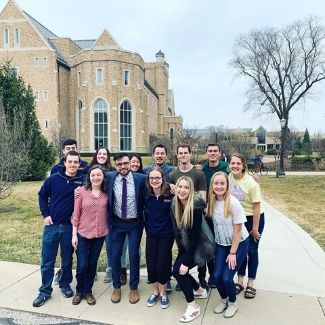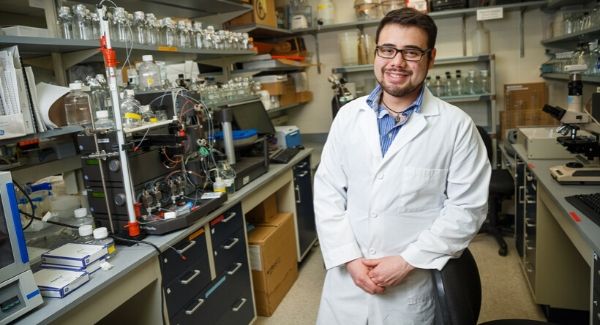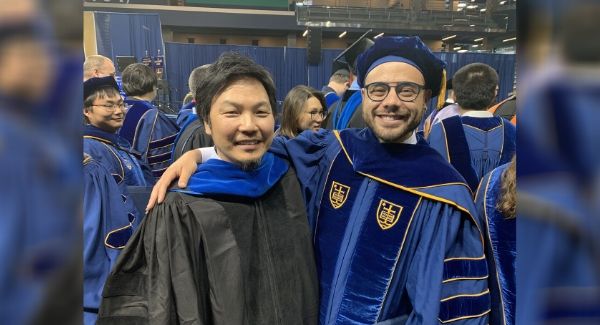Francisco “Pancho” Fields cherishes the memories and skills he gained at Newman University, all of which aided in his journey toward obtaining his doctorate in Biological Sciences at Notre Dame.
His Newman journey started in 2010 when he received the Cardinal Newman Scholarship, now the St. John Henry Newman Scholarship. He didn’t wait long to get highly involved in student life and academic organizations on campus.
In his first year alone he spent time on the cheer squad, worked as a student ambassador and took part in the Student Government Association where he eventually served as president. He especially thrived in theater and science-related activities, later working as a teaching assistant for biochemistry lab and taking part in theater performances, singing with Chorale and the Troubadours as well as spending time as a member of the Sloppy Joe Improv Troupe.
“It’s been six years since I graduated and I look back on the experience so fondly,” Fields said. “The Honors Program was a definitive part of my time at Newman. I loved the academic challenge and creativity it allowed. Plus I met some of my best friends in Cheryl Golden’s Honors Seminar my first year.”
He’s thankful for many professors who offered him mentorship, new opportunities and the chance to foster his creativity and expression during his undergraduate experience.
Fields graduated from Newman in 2014 with a Bachelor of Science in biology and minors in history and theater. He entered straight into the Ph.D. program at Notre Dame where he spent five years completing coursework, working on a research project, mentoring undergraduate students and writing fellowship and grant proposals.
As a graduate student, his classes were mostly completed by the end of his second year and most of his time was then dedicated to research.
“Research demands a lot of time so there wasn’t much leftover for extracurriculars,” he said. But in true Newman fashion, even a little involvement is more than it is for a typical student.

During his time at Notre Dame, Fields found time to enjoy home football game weekends, perform with student-led Humor Artists Improv Troupe and got involved with the Biology Graduate Student Organization, serving as a student representative on the recruitment committee to plan events for and welcome prospective graduate students. He also served as the co-president of the Science Policy Initiative, a student-led group that works to make science more accessible to the general public and also helps them explore careers in public policy.
As for academics, his thesis work focused on the discovery and design of antimicrobial peptides. “These are small proteins that poke holes in bacteria. We wanted to use these antimicrobial peptides as a way to kill antibiotic-resistant bacteria,” he said.
“My proposal for this research was funded by the National Science Foundation and resulted in four first-author publications.”
The IDEA Center, which handles intellectual property from Notre Dame, filed a patent based on Fields’ research.
“The review article was my first published paper; however,” he said, “this was followed up with three research articles that were published in The Journal of Antibiotics, Drug Development Research and ACS: Pharmacology and Translational Science. Each of the studies was a result of hard work from a team of scientists. Science is collaborative and I owe a lot of my success to my peers and mentors.”

Fields said he had five life-changing years at Notre Dame but he couldn’t have gotten there without Newman.
His student life and academic experience played a large role in his preparedness and success at Notre Dame but one personal experience is what drew him to his thesis topic of the discovery and design of antimicrobial peptides.
During the spring semester of his freshman year at Newman, Fields was diagnosed with an antibiotic-resistant staphylococcus aureus infection, commonly known as MRSA.
Fields said, “The infection would flare up again and again. With each successive infection, the antibiotics would become less effective. After a regiment of diluted bleach baths to reset the bacteria living on my skin, the infections cleared up but I was left with a burning question, ‘How can I help to address the issue of antimicrobial resistance?’
“This is what piqued my interest in Dr. Shaun Lee’s lab at the University of Notre Dame. His lab focuses on the discovery and application of bacteriocins, the antimicrobial peptides of bacteria,” he said.
At Newman, professors from various departments across campus — English, history, science, music and theater — helped Fields develop the knowledge and skills he needed to succeed in graduate school.
“The most important skill that Newman provided me with was critical thinking,” he said. “Scientists are tasked with taking deep dives into research questions and the implications of their data. I believe it was my humanities courses; history, writing and the few Newman Studies Program courses, that fostered this skill the most. Thanks to Dr. (Kelly) McFall and Dr. (Bryan) Dietrich.”
He added, “Newman might be small, but it is mighty. It will prepare you well for life after college.”
Now that he has completed his Ph.D., Fields is looking forward to his future plans.
He has accepted a shared postdoctoral scholar position at the University of Toronto and a local startup. “It’s the perfect job for me since the project still focuses on antimicrobials and gives me exposure to the industry side of science,” he said.

